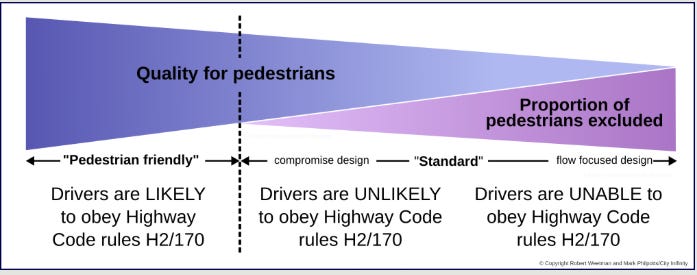Radical pedestrianism, #184
It may be oxymoronic, but bear with us.
This week, it may be getting darker outside but there’s plenty of bright spots, if you know where to look. Yes there’s walking news but there’s also the usual smorgasbord of cycling content here for you - from the huge and growing power of cycle share to the US cities where cars are optional.
BIG STORIES FOR CYCLING ADVOCACY
BIKE SHARE DELIVERS €305M ACROSS EU. First of its kind research, from EIT Urban Mobility and Cycling Industries Europe (CIE), is the first to quantify the economic and social investments of bike share in Europe. Those €305M benefits include “224,000 tons of CO₂ emissions avoided, more than 4,200 chronic diseases prevented, and nearly 13,000 jobs supported”. 150 European cities now have bike share, with London being the biggest, supporting 28m dockless hire trips in 2024.
RADICAL PEDESTRIANISM? That’s what Mark Philpotts (aka Ranty Highwayman) and Robert Weetman have been doing, in considering what if things for pedestrians weren’t terrible? In an important piece of work for Manchester City Council, Philpotts and Weetman have dissected what makes the walking experience bad, and what would make it better. It all starts, as is right, with fixing the humble side road. You can see their respective reflections, which complement each other in the links above.
US CITIES WHERE CARS ARE OPTIONAL. New research underlines a growing potential for living car-free or car-light in America. Of 180 cities analysed, Minneapolis comes top, with its 200 miles of bike lanes. Second and third are Miami, with its dense neighbourhoods well-served by public transport and Pittsburg, where nearly a quarter of residents commute without a car. In the US there’s a growing sub-prime car loans crisis, with 9.6% of car loans are in delinquency. Given you need a car to work in much of America, this is concerning - and underlines the value of alternatives.
PEOPLE WANT PAVEMENTS BACK. That’s the cry of Guide Dogs UK, as it pushes for long-overdue action on the problem. Blocked pavements particularly impact those with visual impairments or blindness, those who use wheelchairs or push pushchairs and elderly and young people. Three quarters of councils support being given the powers to enforce pavement parking bans - because while Scotland and most of London councils have been able to ban pavement parking, currently most cannot without government legislation.
PAVEMENT PARKING ACTION. Pretty much everyone agrees pavement parking is A Bad Thing. The tricky bit seems to be turning that broad consensus into action. Ahead of the five-year anniversary of the government’s pavement parking consultation Living Streets is keeping up the pressure, by crowdsourcing where and when the issue is affecting people. People are being asked to upload locations and images of the problem before 22 November.
OTHER HEADLINES
START YOUR OWN BIKE BUS. Growing in popularity and strength, across the world, bike buses are a fantastic way to get kids to and from school, together, without cars. The group cycle rides that stop at homes and meeting points on the way, can transform the school run for families, boosting kids’ wellbeing and engagement at school. The Bikeability Trust has now produced a Bike Bus Leaders Guide to help more of these fantastic initiatives to grow and thrive. There’s tips and advice on everything from getting started to bringing the community together - brilliant.
INTERESTING GRAPH OF THE WEEK: The continuum of pedestrian-friendliness, from the Weetman/ Philpotts collaboration, with more to come. Source.
ACTIVE TRAVEL WORD OF THE WEEK:
Car-lite development. The planning and delivery of neighbourhoods where cars are optional. For this to happen, people need alternatives, including public transport, walking and cycling links and things like car share - because owning a car means you use one more.
Until next time,
Adam
Adam Tranter
CEO, Fusion & Founder, #BikeIsBest
This newsletter is brought to you by Fusion, the agency for movers, specialising in communications and public affairs for active travel and mobility.






